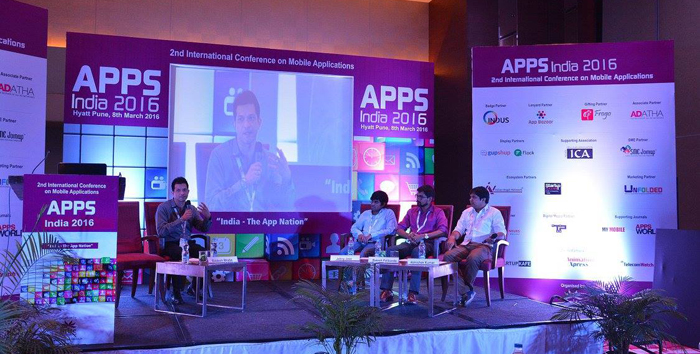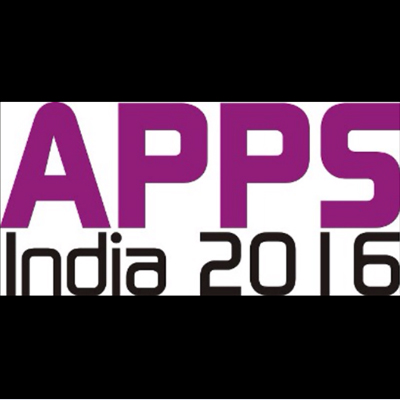On 8 March, 2016, Pune witnessed the second Apps India Conference that took place in Hotel Hyatt. The conference witnessed many industry veterans and start-ups attending in order to discuss growth opportunities and challenges of India’s mobile eco-system. Themed ‘India-The App Nation’, Apps India 2016 event offered an ideal interactive business platform for the key decision makers, start-ups and young entrepreneurs across the Apps business ecosystem in India .
The conference covered exciting topics and thought provoking issues through keynotes and expert discussion panels providing essential insights on mobile trends, mobile solutions and initiatives such as “Mobile for Development”, “IOT-The Way to Infinite Opportunities”, “Mobile Marketing, Advertising and Analytics”, “Gamification Dynamics to Enhance Business” and “Mobile Gaming- Monetisation, user Acquisition, Retention”. AnimationXpress attended the Apps India Conference and for those who couldn’t attend it, here are the highlights of the event.
Mobile Marketing, Advertising and analytics
Being moderated by Persistent Systems, VP, Akash Sureka had three panelists Imtiaz Ahmed, Sneha Johari and Stephen Andrews. The session was about how mobile applications can use advertisements to generate money and also how one should analyse it.
They said, initially the advertisers don’t care about the analytics, in fact they just want downloads. Once that’s achieved, analytics become an important part as it helps to track down loyal customers. They further said that one shouldn’t be stuck with using just Google Analytics but should also use 3rd party analytics’s like Apps Flyer as it gives a clearer picture to the user.
When asked by an individual from the crowd if we will get to see ads in VR, the panelist said, “Not many in India own VR headsets so the future in VR ads has a long way to come. It would take probably five years for it to develop. Currently VR is viewed from an engagement point and not mobile monetisation. It’s just for users or to draw attention.”
The sessions was followed by Adatha Media, Head – strategic planning and partnerships, Stephen Andrews talking about Cost of user acquisition for mobile apps – organic and paid. He said, ” The three main criteria for the apps to be recognised and come in top spots in Play Store or iOS are: Number of downloads, Retention rate of users and Ranks/ stars. Also App store optimisation (ASO) helps in app discoverability and to accomplish that keywords and description should be sharp, crisp and self explanatory.” He also said that advertisers should create videos that are maximum 30 seconds and are self explanatory as videos are the 2016 trend and works well on social media networks if used in the right way.

Gamification Dynamics is app development
The session was being moderated by Persistent Systems, CEO, eMee & Business Head, Siddesh Bhobe and the panelists included Giftxoxo.com, co founder, Abhishek Kumar; Playlyfe, CEO, Johny Jose; Gamiana, chairman – board of directors, Chetan Shah. They discussed how gamification helps to increase user interaction and build loyalty. They also stressed on the fact that gamification doesn’t have to be restricted just to games but can be extended on larger basis. Gamification basically means behaviour change and/or incentives/rewards that can be intrinsic or extrinsic in nature. If gamification is not used in the right way, it can be annoying and to avoid that one should be analysing the data collected.
Example: There’s an app named Forest that helps one to put down your phone and focus on what’s more important in your life. So whenever you want to focus on your work, plant a tree and in the next 30 mins, it will grow when you are working. But if you leave the app, the tree will get killed. This can be a form of gamification as a person feels motivated to not use the phone till 30 minutes and after that gets rewarded in an intrinsic manner.
Mobile Gaming – Monetisation, User Acquisition, Retention
This session was being moderated by Gamiana, chairman – BOD, Chetan Shah and the panelists included Vserv, VMAX, VP and head of business, Prashant Dixit; redchillies.vfx, lead digital strategist, Sidharth Iyer and Indus OS, chief revenue officer, Vikas Sharma. They gave light to many important factors that a game developer needs to keep in mind while coming up with a game so that they can monetise it in a better manner. Vikas Sharma said, “Monetisation is directly related to users. Indians generally don’t pay to buy games on mobile platforms so advertise funded monetisation module works well. So game developers should have intelligently build in ads; like if a gamer watches the video or the ad then they will be rewarded and they should always keep the users engaged.”
Sidharth mentioned about a few important aspects that developers should pay attention to. He said, “Monetisation should be the last thing in the mind of a game developer. For any game to be successful there are three stages; Discovery, Retention and Monetisation. For discovery, getting associated with a big banner or name helps in getting eyeballs. Once that is achieved, retention comes into play – which is directly proportional to how good is the design of the game and how different and unique is it from its competition in the marketplace, and finally comes monetisation.”
To this Prashant further added, “Indies should think about all these three aspects; discovery, retention and monetisation as more the users come in, better chances of monetising it. The challenge that indies are currently facing is the fact that they think all these three aspects are separate but in reality they all are tied to each other. Game developers need to experiment at the early stage of the game and not wait till 1 lakh downloads as when the game is still in its 5000 download range, they can experiment and see what’s working and not working for them.”
Vikas further added, “One thing should be kept in mind that reference is always critical. Friends and family need to download to get the numbers rolling and spread the word. The game should be uploaded on their own site and 3rd party sites as well because in a Play Store or iOS app store, if a game goes beyond top 20 then it goes unnoticed. They need to initially pay to advertise the game and spread word about it as that will lead to downloads which will in return convert to monetisation of it. Also, organic growth comes only after 2 years.”
With this session came an end to an insightful conference that witnessed about 100 attendees from across India who shared knowledge to help one another grow in the booming mobile rich ecosystem. We wait for Apps India to come again next year with more such insightful sessions.
